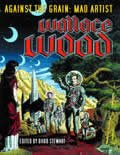Monday, July 02, 2012
Death of Newspapers #25: Evolution of the daily comics page
.
We often read that Mutt and Jeff was the first daily comic strip (November 15, 1907), but how did the daily newspaper comics page of stacked strips come about? Bill Blackbeard and Martin Williams (in The Smithsonian Collection of Newspaper Comics) traced the evolution:
Weekday comic strips in black and white were initiated in the Hearst morning and afternoon papers across the country in the early 1900s. At first these were miniaturized versions of the Sunday strips… Some might appear for as many as ten successive weekdays, but that was accidental; the average frequency was three days a week, and the editorial purpose was to provide daily variety in strips, not daily duplication of the same features… On January 31, 1912, Hearst introduced the nation’s first full daily comic page in his New York Evening Journal, adding it to his other afternoon papers from coast to coast a few days later. Initially made up of four large daily strips, including Herriman’s Family Upstairs and Harry Hershfield’s Desperate Desmond (a continuing cliff-hanger), the Hearst page expanded to five, then six, and finally nine daily strips through the teens and early twenties. Other papers emulated the Hearst example, and by the 1920s the phenomenon was to be found in hundreds of newspapers around the country, fed by dozens of daily strips distributed by a multitude of small syndicates. From these early small syndicates emerged the giants of the thirties, such as Hearst’s King Features, Newspaper Enterprise Association (NEA), the Chicago Tribune New York News Syndicate, the Associated Press and United Features from United Press. By the 1930s, comic strips by the daily pageful and Sunday color section collections were to be found in most American and Canadian newspapers.
--Bill Blackbeard and Martin Williams
August 12, 1926
We often read that Mutt and Jeff was the first daily comic strip (November 15, 1907), but how did the daily newspaper comics page of stacked strips come about? Bill Blackbeard and Martin Williams (in The Smithsonian Collection of Newspaper Comics) traced the evolution:
Weekday comic strips in black and white were initiated in the Hearst morning and afternoon papers across the country in the early 1900s. At first these were miniaturized versions of the Sunday strips… Some might appear for as many as ten successive weekdays, but that was accidental; the average frequency was three days a week, and the editorial purpose was to provide daily variety in strips, not daily duplication of the same features… On January 31, 1912, Hearst introduced the nation’s first full daily comic page in his New York Evening Journal, adding it to his other afternoon papers from coast to coast a few days later. Initially made up of four large daily strips, including Herriman’s Family Upstairs and Harry Hershfield’s Desperate Desmond (a continuing cliff-hanger), the Hearst page expanded to five, then six, and finally nine daily strips through the teens and early twenties. Other papers emulated the Hearst example, and by the 1920s the phenomenon was to be found in hundreds of newspapers around the country, fed by dozens of daily strips distributed by a multitude of small syndicates. From these early small syndicates emerged the giants of the thirties, such as Hearst’s King Features, Newspaper Enterprise Association (NEA), the Chicago Tribune New York News Syndicate, the Associated Press and United Features from United Press. By the 1930s, comic strips by the daily pageful and Sunday color section collections were to be found in most American and Canadian newspapers.
--Bill Blackbeard and Martin Williams
December 20, 1940
May 30, 1953
The pages above show the increase of strips in the stack from six to eight to ten. Note the episode titles above strips in the 1940 page, later dropped to squeeze more strips into the stack. Today, Bill Griffith's Zippy continues the tradition of centering a title above each daily strip.Labels: bill blackbeard, bill griffith, death of newspapers, hearst, martin williams, puck, smithsonian, zippy



